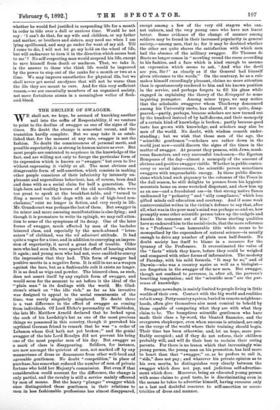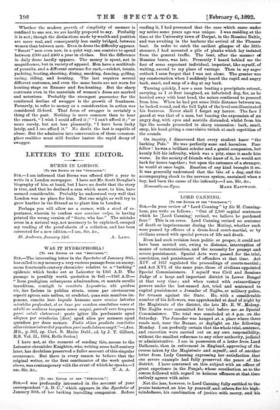THE DECLINE OF SWAGGER.
WE shall not, we hope, be accused of knocking another nail into the coffin of Respectability, ii we venture to point to the decline of swagger as one of the signs of the -times. No doubt the change is somewhat recent, and the transition hardly complete. But we may take it as estab- lished that, for the moment at any rate, swagger is not the fashion. No doubt the consciousness of personal merit, and possible superiority, is as strong in human nature as ever. But most people are contented to acquiesce in the knowledge of the fact, and are willing not only to forego the particular form of its expression which is known as " swagger," but even to live without expressing it visibly at all. The most obvious and disagreeable form of self-assertion, which consists in making other people conscious of their inferiority by intensely un- pleasant and supercilious behaviour, has, of course, been dead and done with as a social claim for half a generation. The high-born and wealthy heroes of the old novelists, who were too great to speak at the breakfast-table, and " turned to fling a morsel to their doge with an air of high-bred non- chalance," exist no longer in fiction, and very rarely in life.
Grandcourt was perhaps the last of them. But swagger in its minor and more amusing manifestations is also dying ; and though it is premature to write its epitaph, we may call atten- tion to some of the symptoms of its decay. One of the later forms of swagger, much affected by men of the bachelor leisured class, and especially by the much-abused " lotus- eaters " of clubland, was the nil admirari attitude. It had quite a vogue for a time, and in addition to conveying an impres- -sion of superiority, it saved a great deal of trouble. Older men who had seen life, were spared the effort of hearing about it again ; and young men who had not, were enabled to convey the impression that they bad. This form of swagger had positive merits in a negative form. It is still in use as a weapon against the bore, but as a fashionable cult it exists no longer. It is as dead as wigs and powder. The leisured class, as such, -does not assert itself by any explicit form of swagger, and would seem for the moment to set before it the ideal of the -" plain man " in its dealings with the world. Mr. Glad- stone's attack on "the idle rich," so far as his invective was designed to appeal to the social resentments of the time, was surely singularly misplaced. No doubt there is a vast difference in the effect of swagger as coming from individuals. Of Lord Eleho's personality at Wimbledon, the late Mr. Matthew Arnold declared that he looked upon the cock of his Lordship's hat as one of the most precious things we possessed in this country, though it provoked his mythical German friend to remark that he was " a cedar of Lebanon whom God hath not yet broken ;" and the genial swagger of the late Lord Rosslyn did not prevent his being one of the most popular men of his day. But swagger as a mark of class is disappearing. Soldiers, for instance, are now amongst the quietest of men, not marked off by any mannerisms of dress or demeanour from other well-bred and agreeable gentlemen. No doubt "competition," in place of purchase, has somewhat reduced the number of men of private fortune who hold her Majesty's commission. But even if that consideration could account for the difference, the change is only partial, and the cavalry is still a service mainly officered by men of means. But the heavy " plunger " swagger which once distinguished these gentlemen in their relations to men in less fashionable professions has almost disappeared,
except among a few of the very old stagers who can. not unlearn, and the very young ones who have not learnt better. Some evidence of the change of manner among soldiers may be found in their increased popularity in general society,—among men, that is ; for it may be doubted whether the other sex quite shares the satisfaction with which men hail the absence of the military swagger. Sir Thomas de Boots no longer comes in " scowling round the room according to his fashion, and a face which is kind enough to assume an expression which seems to ask, ' And who the devil are you, Sir ? ' as clearly as if the General had himself given utterance to the words." On the contrary, he as a rule makes himself exceedingly pleasant, claims no more attention than is spontaneously rendered to him and his known position in the service, and perhaps forgets to fill his glass while engaged in explaining the theory of the Kriegspiel to some inquiring youngster. Among minor types, we may notice that the scholastic swaggerer whom Thackeray denounced among his University snobs, has almost, if not quite, disap- peared,—partly, perhaps, because scholars are now turned out by the hundred instead of by half-dozens, and their monopoly of a certain kind of knowledge is broken ; partly because good taste has grown with knowledge, and scholars may also be men of the world. No doubt, with wisdom cometh under- standing ; but we wish that those men of the age, the "scientific gentlemen "—scholars are rather down in the world just now—could discern the signs of the times in the matter of swagger. At present they possess, with Jews, mush- room financiers, and very successful tradesmen—the Egerton Bompuses of the day—almost a monopoly of the amount of obvious and positive swagger visible. Whether in public contro- versy or social intercourse, the scientific person sometimes swaggers with unquenchable energy. In those public discus. sions which lend such piquancy to the columns of the Times in the dull season, he still delights to pounce from his hygienic mountain home on some wretched disputant, and show him up as an ass—and a fraudulent ass—in that strong native Saxon undimmed by " pedantry " and " silly compliance," which less gifted minds call education and courtesy. And if some weak controversialist writes in the victim's defence to say that, after all, what was in the poor man's mind was perhaps so-and-so, how promptly some other scientific person takes up the cudgels and knocks the nonsense out of him ! These sterling qualities have so endeared him to the social circle, that the mere reference to a "Professor "—an honourable title which seems to be monopolised by the expounders of natural science—is usually enough to drive any number of plain men half-frantic. No doubt society has itself to blame in a measure for the tyranny of the Professors. It overestimated the value of the " facts " which they knew, before they could be weighed and compared with other forms of information. The modesty of Faraday, with his mild formula, " It may be so," and of Darwin—who was a country squire as well as a biologist— are forgotten in the swagger of the new men. But swagger, though not confined to parvenus, is, after all, the parvenu's besetting temptation ; and the "scientific men" are the par- venus of knowledge.
Swagger, nowadays, is mainly limited to people living in little worlds of their own. Contact with the big world and realities rubs it away. Petty country squires, buried in remote neighbour. hoods, often give themselves airs most comical to behold by those capable of comparing what they are with what they claim to be. The bumptious scientific gentlemen who have made their class a by-word, the bloated financier, and the overgrown shopkeeper, even when success is attained, are only on the verge of the world where their training should begin. Their time has been otherwise, and, let us hope, more pro- fitably occupied ; and if they do not reform, their children probably will, and will do their best to reclaim their erring parents. For there is no lesson which that increasingly wise young person, the young man on his promotion, has laid more to heart than that " swagger," or, as he prefers to call it, " side," does not pay ; and whatever his private opinion as to his own merits, he distinguishes very clearly between the swagger which does not pay, and judicious self-advertise. ment which does. Moreover, being an educated young person with some claims to good taste, he is discriminating even in the means he takes to advertise himself, having recourse only as a last and doubtful resource to self-assertion or eccen- tricities of dress and manner. Whether the modern growth of simplicity of manner is confined to one sex, we are hardly prepared to say. Probably it is not ; though the distinctions made by wealth•and position are more real, and consequently less easily bridged, between women than between men. Even in dress the difficulty appears. " Smart " men even now, in a quiet way, can contrive to spend between £300 and :2400 a year in clothes. But the difference in daily dress hardly appears. The money is spent, not in magnificence, but in varietyof apparel. Men have a multitude of pursuits, and• a different costume-for each,—cricket, tennis, yachting, boating, shooting, dining, smoking, dancing, golfing, racing, riding, and , hunting. 'The last requires several different costumes, and even-the, same boots are not worn for hunting stags on Exmoor and fox-hunting. But the sharp contrasts even in the materials of woman's dress are marked and notorious. Probably 'the strongest guarantee for the continued decline of swagger is the growth of frankness. Formerly, to refer to money as a consideration in action was considered ill-bred. That form of swagger is certainly a thing of the past. Nothing is more common than to hear the remark," I wish I could.afford it ;" "I can't afford it;" or more surely, but not less pleasantly, "I have been lucky lately, and I can afford it." No doubt the last is capable of abuse. But the admission into conversation of these common- place realities must still further hasten the rapid decay of swagger.







































 Previous page
Previous page